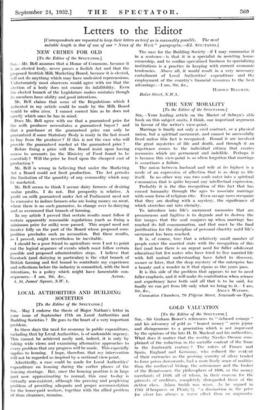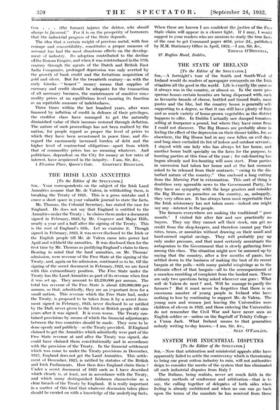GOLD VALUATION [To the Editor of the SPECTATOR.] Stn,—Sir Graham
Bower's references to " tlebased coinage " and his advocacy of gold as " honest money " seem jejune and disingenuous to a generation which is not impressed by the opinions of the late H. D. Macleod and his authorities. What does it matter that the worthy Nicolas Oresme com- plained of the reduction in the metallic content of the franc in the fourteenth century ? The rulers of France and Spain, England and Germany, who reduced the ecntent of their currencies as the growing scarcity of silver tended to force prices downwards, had a more lively sense of realities than the mediaeval bishop, the astronomer and the broker of the Renaissance, the philosophers of 1696, or the money merchants of 1810, all of whom, in their concern for the interests of creditors, completely disregarded those of the debtor class. Adam Smith was wiser. As he argued in 1763 (Cheapness or Plenty ?), "a diminution in. the price for silver has always a worse effect than an augmcnta- Lion . . . (the former) injures the debtor, who should always be favoured." For it is on the prosperity of borrowers that the industrial progress of the State depends.
The idea that a certain weight of precious metal, with free coinage and convertibility, constitutes a proper measure of account has had the most disastrous effects on the develop- ment of industry. Its adoption contributed to the decline of the Roman Empire, and when it was reintroduced in the 17th century through the agents of the Dutch and British East India Companies, prolonged depression was only averted by the growth of bank credit and the fortuitous acquisition of gold and silver. But for the twentieth century—as with the early Greeks—" honest " money means that supplies of currency and credit should be adequate for the transaction of all necessary business, the maintenance of sensitive com- modity prices at an equilibrium level ensuring its function as an equitable measure of indebtedness. - Three times within the last hundred years, after wars financed by inflation of credit in defence of their privileges, the creditor class have managed to get the naturally diminished value of their incomes restored through deflation. The nature of such proceedings has not been realized by the nation, for people regard as proper the level of prices to which they have been accustomed in peace time, and dis- regard the enormously increased burden of debt and the higher level of contractual obligations—apart from which that of commodity prices has no meaning whatever. And politicians, dependent on the City for money at low rates of interest, have acquiesced in the iniquity.—I am, Sir, &c.,
1 Elvaston Place, Queen's Gate. GEOFFREY BIDDL-LPII.































 Previous page
Previous page